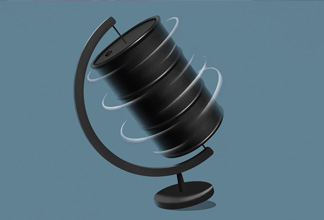Should I Invest or Pay Down My Mortgage?
Written by The Inspired Investor Team
Published on October 14, 2025
minute read
Share:
Whether you are house-hunting or already a homeowner, there’s one question you’re bound to ask yourself at some point: Should I invest or try to pay off my mortgage?
A few years ago, when you could score a mortgage rate below 2 per cent, the answer was more straightforward. At that time, if you felt confident you could earn high single-digit or even double-digit returns in the market,1 then you may have been better off investing excess cash, since your gains would have been higher than what you’d save on interest on your mortgage.
But as borrowing costs have risen, and homeowners are now renewing at rates two or even three times higher than before, the decision has gotten murkier, explains Stuart Gray, Director, Financial Planning Centre of Expertise at RBC. “There’s no black-and-white solution,” he says.
So how do you decide what to do? Gray suggests asking yourself these four questions.
Do I have enough cash flow?
In some ways, deciding what to do all boils down to cash flow. Do you have extra money to pay down your mortgage faster or put into investments?
The monthly cost to carry a mortgage has increased in the past year. On a 25-year mortgage of $350,000 – the current average loan value in Canada2 – a 4.95% interest rate would cost almost $2,000 a month, versus $1,450 for that same mortgage when rates were below 2% back in 2022.3
Having to find an extra $500 a month makes it harder to invest or pay off debts quickly. “Your mortgage, or any debt, requires a monthly payment,” Gray explains. “Where is that coming from?”
How comfortable am I with risk?
Your own comfort with risk can also play a major role in what you decide to do. If you can stomach the ups and downs that can come with investing, you could consider putting your money into the market. Of course, the market isn’t your only option. You could also explore more secure options like a guaranteed investment certificate, although it may be challenging to find one offering an interest rate that’s higher than the one on your mortgage.
Over the past decade, the S&P/TSX Composite Index has returned an average price of 8.12 per cent annually as of October 8,4 while the S&P 500 has delivered about a 13 per cent annual return over the same period5 (their returns are even higher if you factor in dividends). Even with today’s higher mortgage rates, those returns would mean you could come out ahead. But of course past performance doesn’t guarantee and you can’t know how markets will perform from one year to the next. “An investor comfortable with fluctuations who is investing for the long term may lean toward investing, because the expected returns over time should be greater,” Gray says.
Of course, many people feel differently, especially those who get nervous when there’s a big drop, like we saw in 2022, when the Canadian market fell by 9.5 per cent and the S&P 500 fell by 24 per cent. If that sounds like you, you might opt for the certainty of paying down debt. “That capacity for risk is an important consideration,” he says
What is your tax bracket?
The decision to pay down your mortgage or invest isn’t as simple as your cash flow plus risk tolerance; the math can be more complicated. It could also be a good idea to factor in taxes, which can depend on the type of account (RRSP, TFSA, non-registered, etc.) the investments are made in and type of income (capital gains, interest, dividends, etc.) they generate.
You pay down your mortgage with after-tax returns – money that’s left over in your account after the Canada Revenue Agency has taken its cut. Depending on the account you’re using and the tax bracket you’re in, you may need to earn twice as much as you need to repay your mortgage to make investing worth it.
That’s a harder hurdle to clear over short time frames. “If you’re talking four or five years, that’s a very different conversation than if you’re talking 15 to 20,” Gray says.
However, contributions to a tax-free savings account (TFSA) are made with after-tax returns, so there is more of an apples-to-apples comparison. With a registered retirement savings plan (RRSP), however, your tax refund can be used to pay down debt.
“If I have $20,000 and invest it in my RRSP, I could get a $10,000 tax refund, and use that refund to pay down my mortgage,” he explains. “That way you’re getting the best of both worlds.”
What am I trying to achieve?
Numbers are important, but they’re not everything. Whether you're looking to pay off your mortgage faster or weighing whether you should put all your savings into your down payment, you also have to consider how you feel about debt and how that might affect your long-term plans.
“Start with what you’re trying to achieve,” says Gray. “What do you want your money to do for you? What’s important to you?”
Some people will simply feel better knowing their mortgage is paid off. Others are comfortable carrying debt if it means saving more for the future. However, if you choose to focus on the mortgage first, and can pay it off, consider investing some of your freed-up money.
“As soon as your mortgage is gone, you could consider contributing that same amount to your investments,” Gray says. “You were already making that payment anyway.”
He also points out that home ownership itself is a form of investment. “When you look at your mortgage and your home together, you have a growing asset that grows more by paying down the mortgage,” he says. “More of the capital from your property becomes yours and less of it becomes the lender’s.”
In the end, there is no wrong answer. Both scenarios could potentially increase your net worth and, hopefully, put more money into your pocket one day.
“We often get stuck on this idea that I have to invest or pay down my mortgage because that’s what my parents drilled into me,” says Gray. “But maybe you’re comfortable carrying a mortgage because you want to do something else with your money. You need to understand your own situation.”
Sources
1. S&P Global, “S&P/TSX Composite Index, 2025
2. Canada Mortgage and Housing Corporation, “Average Value of New Mortgage Loans: Canada, Provinces and CMAs”, October 2025
3. Calculated using RBC’s Mortgage Calculator
4. S&P Global, “S&P/TSX Composite Index”, 2025
5. S&P Global, “S&P 500”, 2025
RBC Direct Investing Inc. and Royal Bank of Canada are separate corporate entities which are affiliated. RBC Direct Investing Inc. is a wholly owned subsidiary of Royal Bank of Canada and is a Member of the Canadian Investment Regulatory Organization and the Canadian Investor Protection Fund. Royal Bank of Canada and certain of its issuers are related to RBC Direct Investing Inc. RBC Direct Investing Inc. does not provide investment advice or recommendations regarding the purchase or sale of any securities. Investors are responsible for their own investment decisions. RBC Direct Investing is a business name used by RBC Direct Investing Inc. ® / ™ Trademark(s) of Royal Bank of Canada. RBC and Royal Bank are registered trademarks of Royal Bank of Canada. Used under licence.
© Royal Bank of Canada 2025.
Any information, opinions or views provided in this document, including hyperlinks to the RBC Direct Investing Inc. website or the websites of its affiliates or third parties, are for your general information only, and are not intended to provide legal, investment, financial, accounting, tax or other professional advice. While information presented is believed to be factual and current, its accuracy is not guaranteed and it should not be regarded as a complete analysis of the subjects discussed. All expressions of opinion reflect the judgment of the author(s) as of the date of publication and are subject to change. No endorsement of any third parties or their advice, opinions, information, products or services is expressly given or implied by RBC Direct Investing Inc. or its affiliates. You should consult with your advisor before taking any action based upon the information contained in this document.
Furthermore, the products, services and securities referred to in this publication are only available in Canada and other jurisdictions where they may be legally offered for sale. Information available on the RBC Direct Investing website is intended for access by residents of Canada only, and should not be accessed from any jurisdiction outside Canada.
Explore More

The Hidden Costs of Being Single
How single Canadians can build wealth on their own terms
minute read

What Investors Can Learn from Hockey Star and RBC Olympian Sarah Nurse
Nurse's path to the podium reveals how preparation, planning and practice can turn potential into a golden opportunity
minute read

Crude Questions? A Look at Canada’s Oil Economy
What you need to know about Canada’s oil industry
minute read
Inspired Investor brings you personal stories, timely information and expert insights to empower your investment decisions. Visit About Us to find out more.







